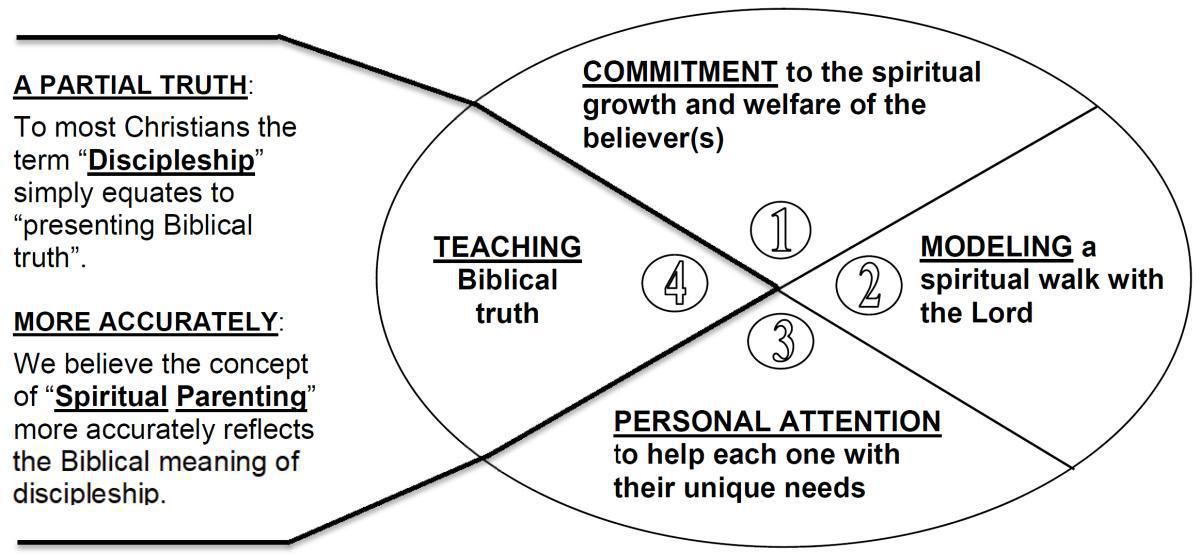A BIBLICAL MODEL FOR PERSONAL DISCIPLESHIP
While “Personalized Discipleship” (Spiritual Parenting / Spiritual Mentoring / Spiritual Coaching) will accelerate spiritual growth, is there Biblical support for it?
Let’s consider the example of Personalized Discipleship found in 1 Thessalonians 2:3-13, where Paul clearly depicts himself as a “Spiritual Parent” (Spiritual Father and Mother), caring for his spiritual children. He lays out how a Spiritual Mentor (or parent) should relate to each spiritual child, or disciple. The human parallel is intentional and unmistakable.
(From Paul, with Silas and Timothy) 1 Thessalonians 2:3-13
THEY WERE SINGLE-MINDED IN PURPOSE
:3-6 … so we speak, not to please men, but rather God, who examines our hearts. For we never used flattering speech, as you know, or had greedy motives—God is our witness—and we didn’t seek glory from people, either from you or from others. Although we could have been a burden as Christ’s apostles, …
THEY CARED FOR THE BELIEVERS AS A MOTHER CARES FOR HER CHILDREN
:7-8 … instead we were gentle among you, as a nursing MOTHER nurtures her own children. We cared so much for you that we were pleased to share with you not only the gospel of God but also our own lives, because you had become dear to us.
THEY BECAME “ROLE MODELS” TO THE NEW BELIEVERS
:9-10 For you remember our labor and hardship, brothers. Working night and day so that we would not burden any of you, we preached God’s gospel to you. You are witnesses, and so is God, of how devoutly, righteously, and blamelessly we conducted ourselves with you believers.
THEY GAVE INDIVIDUAL ATTENTION AND INSTRUCTION AS A FATHER
:11-12 As you know, like a FATHER with his own children, we encouraged, comforted, and implored EACH ONE of you to walk worthy of God, who calls you into His own kingdom and glory.
THE WORD OF GOD WAS AN ESSENTIAL COMPONENT OF DISCIPLESHIP
:13 This is why we constantly thank God, because when you received the message about God that you heard from us, you welcomed it not as a human message, but as it truly is, the message of God, which also works effectively in you believers.
Too often believers are left to fend for themselves, with the apparent assumption that simply hearing biblical presentations and being in the presence of other believers will be sufficient.
Each new believer has unique spiritual needs that should be addressed during this initial formative stage and many new Christians would have experienced much more spiritual growth had someone given them adequate personal attention when they first accepted Christ as their Savior.
New believers will often come to correct conclusions if biblical truths are clearly presented in a personal setting where they can voice their questions and concerns.
The following Biblical timeline depicts the life of a Christian, resulting in accelerated spiritual growth.
1. Represents the “unsaved” period of time (spiritually dead to God) in a person’s life, from physical birth to spiritual birth. During this period “self-dependence” becomes a habit of everyday living, a way of life.
2. Represents the “Evangelism” stage, culminating in the event of salvation, at which time a person passes from being spiritually dead to being spiritually alive to God.
3. Represents the “Spiritual Mentoring” or Spiritual Parenting” stage, that is, the critical formative period of time in which a Christian needs a more mature believer to come alongside them, disciple them through the first steps of learning to increasingly live in dependence on the Holy Spirit. This will accelerate their growth toward spiritual maturity.
4. Represents the process of “Sanctification.” Having been personally discipled, the believer now has a basic understanding of the Master-servant relationship and the need to abide daily and follow the Holy Spirit, so as to continue being led and transformed by Him.
Jesus commanded us to make "disciples,” not just converts. In the Christian community there are many immature “converts,” but very few disciples.
Typically, there is a window of opportunity for new believers when they are usually hungry, and long for personal guidance, much like a new baby. There is a parallel between the spiritual development of a believer and the development of a baby. In both cases, the initial period is a formative stage. We believe this is why God chose to use spiritual terminology that parallels the human experience; such as “born again”, “baby”, etc.
The typical new believer is excited about having their sins forgiven and knowing that they're going to heaven. However, that enthusiasm should not be mistaken for spiritual understanding. New believers need clear instruction in order to understand how to recognize the Holy Spirit’s involvement in their life, and how to listen to, follow and obey Him. They also need to understand how to cooperate with Him in their own spiritual development.
Often believers, who are left to figure their Christian walk out on their own, end up simply imitating or copying the behavior of those who have been believers longer.
Have you ever made a copy of a copy of a copy? How much like the original are the later copies? This often happens with new believers who model their behavior by watching other Christians who have modeled their behavior after other Christians, and so forth. The focus becomes one of behavior modification rather than the heart attitude of Lordship / surrender and abiding.
We believe many new Christians would have experienced much more spiritual growth had someone given them adequate personal attention when they first accepted Christ as their Savior.
To know the Bible is good, but to intimately know and understand the One revealed BY the Bible is better!
Jeremiah 9:23-24 And This is what the Lord says: The wise man must not boast in his wisdom; the strong man must not boast in his strength; the wealthy man must not boast in his wealth. But the one who boasts should boast in this, that he understands and knows Me— that I am Yahweh, showing faithful love, justice, and righteousness on the earth, for I delight in these things.
John 17:3 This is eternal life: that they may know You, the only true God, and the One You have sent—Jesus Christ.
A goal of the discipler should be to help the disciple (apprentice learner) to mature, function, be fruitful, and to spiritually reproduce. The benefits to the discipler are secondary.
If personal discipleship / mentoring is needed and is effective in conjunction with corporate discipleship, why isn’t it woven into the fabric of most churches?
This is why we need to redefine “discipleship,” to include the personal component and equip all believers to make disciples who make disciples.



